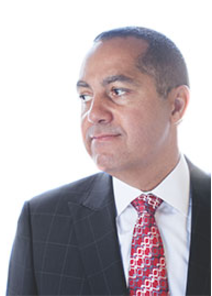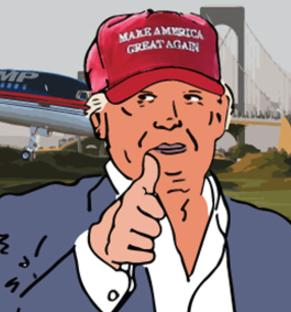While President-elect Donald Trump met with President Barack Obama in the Oval Office Thursday, Jared Kushner strolled the White House’s South Lawn with Obama’s chief of staff Denis McDonough.
The sight of the two men deep in discussion sent tabloids into overdrive: Might Trump tap Kushner to be his chief of staff? Fueling that thesis was the fact Kushner was brought along to the meet-and-greet with the first family, while Trump’s own sons, Eric and Donald Jr., were not.
The 35-year-old CEO of Kushner Companies and publisher of the New York Observer (as of today, simply Observer.com) had long been identified as a key player in Trump’s campaign. He was credited with helping to broker conversations between Trump and former Fox News chief Roger Ailes, mounting a social media offensive and data engine that allowed the campaign to target people who supported Trump on Facebook, and courting Silicon Valley entrepreneurs to help him scale the campaign’s marketing efforts.
As the campaign steamrolled along, Kushner [TRDataCustom] gained increasing influence, with the New York Times dubbing him Trump’s “de-facto campaign manager.” In late August, he reportedly arranged Trump’s meeting with the president of Mexico. Kushner is also one of 12 members of Trump’s transition team, which includes Reince Priebus, the chairman of the Republican National Committee, Paypal co-founder Peter Thiel and Trump campaign chairman Stephen Bannon.
White House pool report: Denis McDonough “led Jared Kushner on a walk down the South Lawn” pic.twitter.com/RZ4ia5lRo5
— Robert Costa (@costareports) November 10, 2016
What Trump’s surprise win Tuesday will mean for Kushner going forward remains a source of speculation, particularly within Kushner’s own business circles in New York. His firm has become a force in the city’s real estate market, making acquisitions worth more than $3 billion since 2005, according to Real Capital Analytics. But will his new status as son-in-law to the chief further add to his clout?
“I think the family closeness will mean that President-elect Tump will continue to confer with him and Jared will provide advice when asked,” said Robert Ivanhoe of Greenberg Traurig, Kushner’s attorney. “When Trump has questions or wants to talk to someone who he really trusts and respects, I would imagine he’ll call Jared.”
Aide de camp
Kushner faces a tough choice between continuing to build his real estate empire and a once-in-a-lifetime shot to be a player at the highest level of government.
“An opportunity to serve our nation has to be compelling,” said Don Peebles, a developer who is considering a run for mayor of New York. “I’m wrestling with that right now as I consider a run — what would it mean for my business? Generally speaking, when you serve in an administration period, you wouldn’t be able to run your business.”

Don Peebles
Kushner was thrust into a leadership role at the company in 2005, after his father, Charles Kushner, went to prison on charges of tax evasion, illegal campaign donations and witness tampering. Jared officially became CEO in 2008, but Charles continues to play a significant behind-the-scenes role at the company and is consulted on almost every aspect of the business, sources said.
The firm has also promoted other executives. In the run up to the election, Kushner named Laurent Morali, who joined in 2008 from Calyon Securities, as the company’s new president, its first in a decade. But sources said that while Morali is present in meetings, Kushner makes the call when it comes to acquisitions and other major decisions.
“I’m sure Jared’s got a good team and his business should be able to continue without him,” Peebles said.
But policy experts told TRD that Kushner may not have a clear path to a job in the White House, thanks to anti-nepotism policies, which dictate that public officials cannot tap their relatives for official positions. He could, however, serve as the head of a task force, such as when President Bill Clinton designated Hillary Clinton the head of a health reform task force in 1993, according to reports.
“I think the son-in-law raises issues under the anti-nepotism statute,” said Richard Painter, a professor of corporate law at the University of Minnesota. “Trump can’t put his son-in-law in the White House. And he can’t encourage somebody else to do so. He can’t promote or advocate for his employment.”
The snarky salmon
In 2006, Kushner paid nearly $10 million for the Observer, a declining but still-relevant newspaper that covered the quirks of the city’s elite with gusto and gave Kushner instant name recognition. But it continued to slide, both in readership and influence.
For months, industry insiders speculated about what motivated Kushner’s role in the Trump campaign. After all, he comes from a long line of Democrats and his paper was the first in New York to endorse Obama for president in 2008. Kushner’s zealous support for his father-in-law put ideological distance between himself and many of his colleagues in the industry — and even his own family members.
Some speculated that he simply craved the spotlight, citing his purchase of the Observer, an attempt to buy the L.A. Dodgers and his trips away on yachts with David Geffen and Wendi Deng, Rupert Murdoch’s ex-wife, as proof that he couldn’t resist the pull of power.
In July, Kushner came under scrutiny from reporters who’d criticized his role in the Trump campaign. But, in later months, Observer brass had been clear that reporters should feel free to write stories that were critical of Trump.
“Jared’s newspaper was clearly a vehicle for many different perspectives including my own, which was one of strong-arm opposition to his father-in-law’s candidacy,” said Jon Reinish, a political strategist and Observer contributor. “My hope is that if Jared is in a position of great influence in this administration, I would hope that he’ll been committed in the same way to listening to and appreciating different viewpoints.”
In August, a political insider told TRD that Kushner’s willingness to take on such a prominent role in the Trump campaign would forever tarnish his legacy.
“The first sentence of his bio will always read ‘Trump’s son-in-law,’ and all of the lasting negatives that go with that will follow him. You mess with the skunk, you get the stink — and the Trump stink is lasting,” the source said.
But Trump won, against all odds, and Kushner’s importance to that victory is likely to carry serious heft.

Donald Trump (illustration by Lexi Pilgrim for The Real Deal)
“I don’t know how much power in business really comes from the fact that your father-in-law is president,” Ivanhoe said. “For the people who go and bid to try to buy a real estate transaction, it comes down to who’s going to pay the best price. When it come to getting a loan from a bank, he’s always been an honorable person with a quality reputation, but maybe having his father-in-law being president will help that even more.”
Though some may have viewed Trump’s run as something straight out of “The Producers,” with the candidate and his staff seemingly sabotaging themselves every step of the way, Kushner may have seen a path to victory all along.
“The family was always more optimistic about Trump’s chances than the press,” Ivanhoe said. “As late as 6.30 p.m. on election night, whatever channel I was watching said there was a 90 percent chance Hillary was going to win. They knew you can’t believe everything you read in the press.”
Rich Bockmann contributed reporting.
